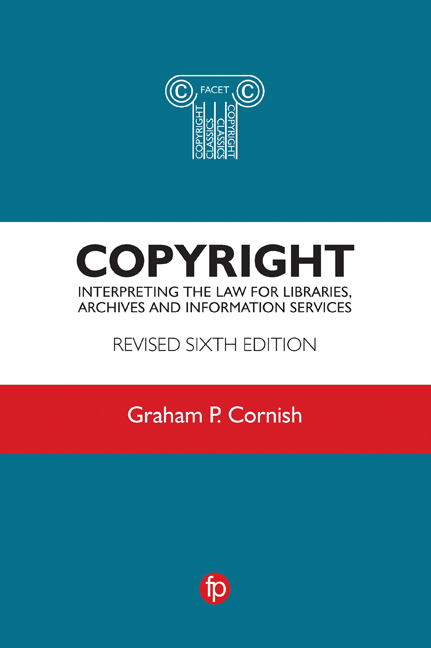Book contents
- Frontmatter
- Contents
- Author's note
- Acknowledgements
- List of abbreviations
- Introduction
- Section 1 Definition and law
- Section 2 What is covered by copyright?
- Section 3 Rights and limitations
- Section 4 Literary, dramatic and musical works
- Section 5 Artistic works
- Section 6 Sound recordings and performers’ rights
- Section 7 Films and videos
- Section 8 Broadcasts
- Section 9 Databases
- Section 10 Licensing schemes and licences
- Section 11 Computer programs, the electronic world and websites
- Section 12 Other matters
- Useful Addresses and Contacts
- Useful Sources of Information
- Appendix: suggested declaration forms
- Index
Section 6 - Sound recordings and performers’ rights
Published online by Cambridge University Press: 19 November 2019
- Frontmatter
- Contents
- Author's note
- Acknowledgements
- List of abbreviations
- Introduction
- Section 1 Definition and law
- Section 2 What is covered by copyright?
- Section 3 Rights and limitations
- Section 4 Literary, dramatic and musical works
- Section 5 Artistic works
- Section 6 Sound recordings and performers’ rights
- Section 7 Films and videos
- Section 8 Broadcasts
- Section 9 Databases
- Section 10 Licensing schemes and licences
- Section 11 Computer programs, the electronic world and websites
- Section 12 Other matters
- Useful Addresses and Contacts
- Useful Sources of Information
- Appendix: suggested declaration forms
- Index
Summary
Definition
What is the definition of a sound recording?
The definition of a sound recording is not limited in any way by format. It is any form of recording of sounds from which sounds may be reproduced. So it includes wax cylinders, vinyl discs, audio cassettes, compact discs and DVDs. It also includes sounds recorded and stored in digital form from which sounds can be reproduced.
Do the sounds have to be human voices or produced by musical instruments?
No. The sounds could be of birdsong or a steam train, for example.
Authorship
Remember that this section applies to the recording and not to the content. Any music or words recorded will be protected as literary or musical works (see Sections 4 and 6.7)
Who is the author of a sound recording?
The producer. Remember this is only the physical record, content of the recording is a separate matter.
Who counts as the producer?
This term is defined as the ‘person by whom the arrangements necessary for the making of the sound recording are made’.
Does the producer of a sound recording enjoy moral rights?
No.
Ownership
Who owns the copyright in a sound recording?
It is owned by the recording company that produced the physical carrier of the recording if it is a commercial recording. If it is produced privately by an individual, then the individual owns the copyright. See also Section 3.19 for unpublished materials bequeathed to archives and libraries. If the recording is subject to extended or revived copyright (see Section 6.31) then special rules apply.
Who owns the content of a sound recording?
It is very important to distinguish between the copyright in the sound recording and the copyright in the material recorded.
Examples: A recording of a song by the Beatles has all sorts of copyrights – the song, the music, the arrangement and the performance. In addition, there is a copyright in the actual sound recording, which is quite separate. Similarly, an interview for an oral history project has a copyright in what the person said, which belongs to the person interviewed. There is also a copyright in the recording made of that interview, which is owned by the person who made the arrangements for making the recording. Again, a recording of Beethoven's Fifth Symphony has a copyright in the recording although there is no longer any copyright in the music itself.
- Type
- Chapter
- Information
- CopyrightInterpreting the law for libraries, archives and information services, pp. 105 - 116Publisher: FacetPrint publication year: 2019



